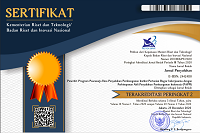Kondisi Sosial Ekonomi dan Modal Sosial pada Berbagai Tingkat Partisipasi Peserta Program Pos Pemberdayaan Keluarga (Kasus Posdaya Mandiri Terpadu, Desa Cikarawang, Kecamatan Dramaga, Kabupaten Bogor)
Abstract
The purpose of this study are analyze the influence of socio-economic conditions and social capital on the level of program’sparticipation. The correlation level between of program’s participation are access to welfare benefits and economic benefits of thePosdaya Integrated Self. The research was conducted in the village of Cikarawang, District Dramaga. This study uses quantitativeand qualitative approaches. The results showed that the socio-economic conditions and social capital owned by the participantsrelated to the level of program participation program, and the level of participation in the program achieved the degree ofparticipation of tokenism Arnstein. Correlation test results demonstrate, there is a significant and strong correlation betweensocioeconomic conditions and social capital on the level of program participation. Other results show that the participationrate also has a significant and strong correlation with access to welfare benefits and economic benefits received by programparticipants.
Keywords: Access to Welfare and Economic, Participation,Social Capital, Socio-Economic Condition
Downloads
Authors who publish with this journal agree to the following terms:
- Authors retain copyright and grant the journal right of first publication with the work simultaneously licensed under a

This work is licensed under a Creative Commons Attribution 4.0 International License that allows others to share the work with an acknowledgement of the work's authorship and initial publication in this journal. - Authors are able to enter into separate, additional contractual arrangements for the non-exclusive distribution of the journal's published version of the work (e.g., post it to an institutional repository or publish it in a book), with an acknowledgement of its initial publication in this journal.
- Authors are permitted and encouraged to post their work online (e.g., in institutional repositories or on their website) prior to and during the submission process, as it can lead to productive exchanges, as well as earlier and greater citation of published work (See The Effect of Open Access).















